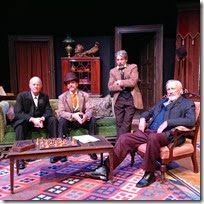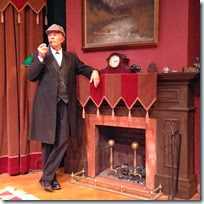There seems to be a great deal of interest in Sherlock Holmes, et al, recently. Last month, The Theater Project mounted a hilarious production of a three-men-play-26-roles Hound of the Baskervilles; PBS has just announced that Benedict Cumberbatch will return as a 21st century version of the master sleuth; CBS-TV's Elementary is a mega-hit; a toddler's board book featuring a Holmes story has just hit the bookstores; and the Summit Playhouse opens The Game's Afoot, a satirical "take" on Holmes, next week. If that's not enough for Holmes aficionados, along comes The Bickford Theatre (in collaboration with Vermont's Oldcastle Theatre Company) with Sherlock Holmes: The Knight's Gambit, an entirely original Sherlock Holmes play by Paul Falzone.
 Without giving too much away, suffice it to say that Falzone has retained many hallmarks of a Holmes caper while inventing a totally original plot. Once again, Professor Moriarty, Holmes' arch-nemesis, is hatching a nefarious plot, one that he hopes will result in the master sleuth 's humiliation, along with political havoc that will ripple throughout Europe. Too, Holmes has to contend with the rather dim-witted Scotland Yard policeman, Inspector Lestrade, and Holmes continues to exhibit a seemingly bottomless knowledge of arcane subjects (late 15th-century manuscripts, for instance).
Without giving too much away, suffice it to say that Falzone has retained many hallmarks of a Holmes caper while inventing a totally original plot. Once again, Professor Moriarty, Holmes' arch-nemesis, is hatching a nefarious plot, one that he hopes will result in the master sleuth 's humiliation, along with political havoc that will ripple throughout Europe. Too, Holmes has to contend with the rather dim-witted Scotland Yard policeman, Inspector Lestrade, and Holmes continues to exhibit a seemingly bottomless knowledge of arcane subjects (late 15th-century manuscripts, for instance).
Falzone's familiarity with the original stories is evident in the amount of evidence of Sherlock Holmes' prodigious powers of deduction that threatens to overwhelm the audience, ultimately, however, it ends up adding a satiric touch to the play. Because Holmes' observation of seemingly innocent details doesn't require much physical action, the result is long declamatory speeches delivered in rather bombastically and quickly by the four actors involved, but it is a style appropriate to the iconic characters. And Falzone makes his Holmes clever by a half, so that this behavior is even more outrageous than in the original. This may delight Holmes' aficionados, but baffle theatergoers unfamiliar with the character.
 The play stumbles a bit, however, in Falzone's use of a chess game to delineate just what Moriarty is up to. The game is afoot, but unless one is familiar with chess, Holmes' explanations can be perplexing. The key is in the play’s title: In chess, the piece called the knight is unusual in that it can move horizontally and vertically, can "jump over" all other pieces to reach its destination square and can capture an enemy piece by replacing it on its square. The "gambit" is an opening move meant to gain advantage, usually by removing a piece from the board. These two terms, I think, relate to the machinations Moriarty—a man so bad that Watson says, “Moriarty makes evil people look good"—employs to spread his evil throughout Europe. And because the ultimate goal of a game of chess is to capture/kill the king, the principle fits neatly with the plot.
The play stumbles a bit, however, in Falzone's use of a chess game to delineate just what Moriarty is up to. The game is afoot, but unless one is familiar with chess, Holmes' explanations can be perplexing. The key is in the play’s title: In chess, the piece called the knight is unusual in that it can move horizontally and vertically, can "jump over" all other pieces to reach its destination square and can capture an enemy piece by replacing it on its square. The "gambit" is an opening move meant to gain advantage, usually by removing a piece from the board. These two terms, I think, relate to the machinations Moriarty—a man so bad that Watson says, “Moriarty makes evil people look good"—employs to spread his evil throughout Europe. And because the ultimate goal of a game of chess is to capture/kill the king, the principle fits neatly with the plot.
 Eric Peterson's firm, strong directorial hand is evident in the steady pace of the production; despite long, if too-quickly delivered, speeches punctuated by short bursts of action, the energy doesn't flag. Of course, a smart quartet of actors helps him to pull off this game effectively. Nick Plakais (above) is an appropriately pompous, arrogant Sherlock Holmes, humorless in the face of Richard Howe's playful, droll Dr. Watson. As the thick-headed Lestrade, Bill Tatum is the perfect foil for Holmes' more agile wit. And Scott McGowan is a treat as Lecomte (above, center, entering as Innes), Moriarty's hired assassin; he gets to don a variety of disguises and accents as he pops in from time to time. His appearances enliven what could be an overly cerebral narrative.
Eric Peterson's firm, strong directorial hand is evident in the steady pace of the production; despite long, if too-quickly delivered, speeches punctuated by short bursts of action, the energy doesn't flag. Of course, a smart quartet of actors helps him to pull off this game effectively. Nick Plakais (above) is an appropriately pompous, arrogant Sherlock Holmes, humorless in the face of Richard Howe's playful, droll Dr. Watson. As the thick-headed Lestrade, Bill Tatum is the perfect foil for Holmes' more agile wit. And Scott McGowan is a treat as Lecomte (above, center, entering as Innes), Moriarty's hired assassin; he gets to don a variety of disguises and accents as he pops in from time to time. His appearances enliven what could be an overly cerebral narrative.
The production values enhance the play immensely. Atmospherically lit by Roman Klima, Carl Sprague's set epitomizes the Edwardian setting of Sir Arthur Conan Doyle's stories. Ditto Liz Stott's costumes, Ric McAllister's props and Cory Frank's sound.
In Sherlock Holmes: The Knight's Gambit, Paul Falzone has pulled out all the stops to give us a rather complicated, somewhat talky caper. Holmes fans will be delighted with the play; others may be a bit bored by the endless chatter. The second act is especially long as he tries to tie up all the loose ends.
Nevertheless, the Bickford Theatre (and its collaborators) are to be commended for bringing a totally original Sherlock Holmes to the stage. Slowing down the delivery and including a note regarding chess terms in the program might make the chess references more comprehensible, thus increasing the audience's appreciation of the playwright's artistry.
Sherlock Holmes: The Knight's Gambit will be performed at the Bickford Theatre in the Morris Museum, 6 Normandy Heights Road, Morristown, through November 10. For information and tickets, call 973.971.3106.
(Note: the photo of Ruth Ross comes from her days teaching Detective Fiction to senior English students at Chatham High School.)
Photo by Tom Kelcec
